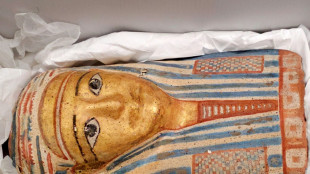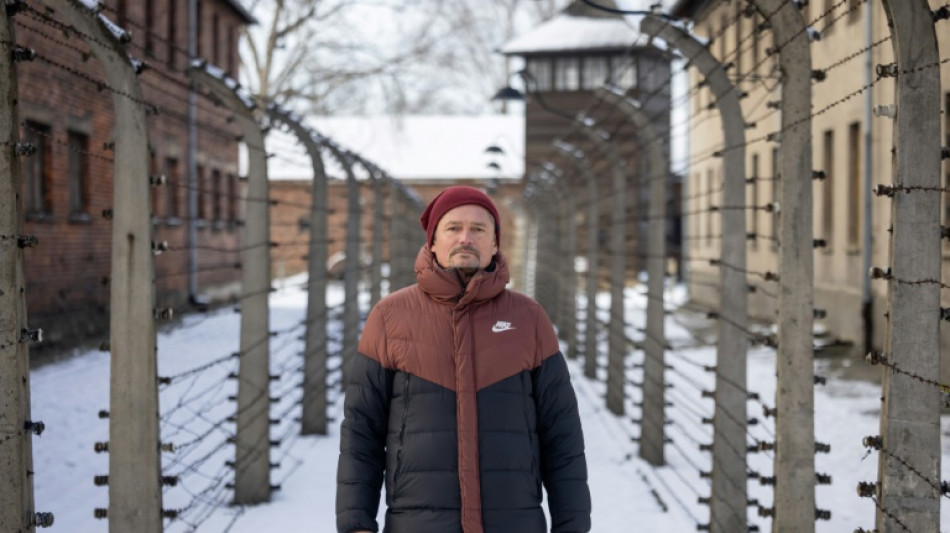
-
 Gu pipped to gold again as Meillard extends Swiss ski dominance at Olympics
Gu pipped to gold again as Meillard extends Swiss ski dominance at Olympics
-
Barca suffer title defence blow in Girona derby defeat

-
 Brentford edge out sixth-tier Macclesfield in FA Cup
Brentford edge out sixth-tier Macclesfield in FA Cup
-
Canada's Oldham wins Olympic freeski big air final, denying Gu gold

-
 France loosens rules on allowing farmers to shoot wolves
France loosens rules on allowing farmers to shoot wolves
-
USA thrash Sweden to reach Olympic women's ice hockey final

-
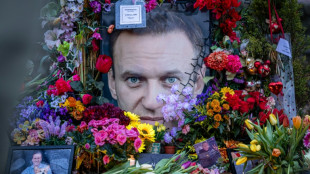 Russian poisonings aim to kill -- and send a message
Russian poisonings aim to kill -- and send a message
-
France's Macron eyes fighter jet deal in India

-
 Arsenal to face third-tier Mansfield, Newcastle host Man City in FA Cup
Arsenal to face third-tier Mansfield, Newcastle host Man City in FA Cup
-
Robert Duvall: understated actor's actor, dead at 95

-
 'How long?': Day Three of hunger strike for Venezuelan political prisoners' release
'How long?': Day Three of hunger strike for Venezuelan political prisoners' release
-
Berlinale: Film director Mundruczo left Hungary due to lack of funding

-
 Malinin talks of 'fighting invisible battles' after Olympic failure
Malinin talks of 'fighting invisible battles' after Olympic failure
-
'Godfather' and 'Apocalypse Now' actor Robert Duvall dead at 95

-
 Sinner serves up impressive Doha win on his return
Sinner serves up impressive Doha win on his return
-
Luis Enrique dismisses 'noise' around PSG before Monaco Champions League clash
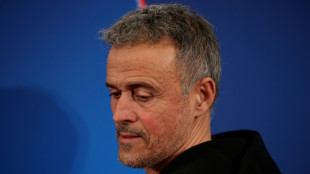
-
 Grief-stricken McGrath left in shock at Olympic slalom failure
Grief-stricken McGrath left in shock at Olympic slalom failure
-
Brignone leads charge of veteran women as Italy celebrates record Olympic haul

-
 Sri Lanka's Nissanka leaves Australia on brink of T20 World Cup exit
Sri Lanka's Nissanka leaves Australia on brink of T20 World Cup exit
-
England match-winner Jacks proud, confident heading into Super Eights

-
 St Peter's Basilica gets terrace cafe, translated mass for 400th birthday
St Peter's Basilica gets terrace cafe, translated mass for 400th birthday
-
Meillard hails Swiss 'golden era' after slalom win caps Olympic domination

-
 Sri Lanka fight back after strong start by Australia's Marsh, Head
Sri Lanka fight back after strong start by Australia's Marsh, Head
-
Kovac calls on Dortmund to carry domestic 'momentum' into Champions League
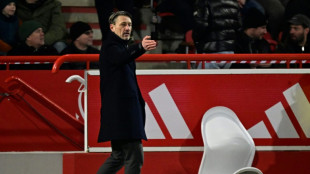
-
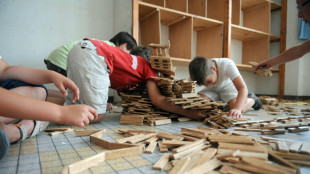 Dutch inventor of hit game 'Kapla' dead at 80: family
Dutch inventor of hit game 'Kapla' dead at 80: family
-
Benfica's Mourinho plays down Real Madrid return rumour before rematch
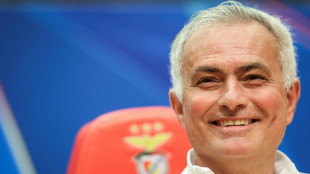
-
 St Peter's Basilica gets terrace cafe for 400th anniversary
St Peter's Basilica gets terrace cafe for 400th anniversary
-
Meillard extends Swiss Olympic strangehold while Gu aims for gold

-
 Meillard crowns Swiss men's Olympic domination with slalom gold
Meillard crowns Swiss men's Olympic domination with slalom gold
-
German carnival revellers take swipes at Putin, Trump, Epstein

-
 England survive Italy scare to reach T20 World Cup Super Eights
England survive Italy scare to reach T20 World Cup Super Eights
-
Gold rush grips South African township
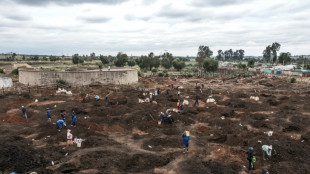
-
 'Tehran' TV series producer Dana Eden found dead in Athens
'Tehran' TV series producer Dana Eden found dead in Athens
-
Iran FM in Geneva for US talks, as Guards begin drills in Hormuz Strait

-
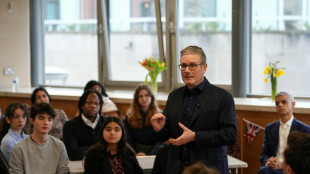 AI chatbots to face UK safety rules after outcry over Grok
AI chatbots to face UK safety rules after outcry over Grok
-
Sakamoto fights fatigue, Japanese rivals and US skaters for Olympic women's gold

-
 'Your success is our success,' Rubio tells Orban ahead of Hungary polls
'Your success is our success,' Rubio tells Orban ahead of Hungary polls
-
Spain unveils public investment fund to tackle housing crisis

-
 African diaspora's plural identities on screen in Berlin
African diaspora's plural identities on screen in Berlin
-
Del Toro wins shortened UAE Tour first stage

-
 German carnival revellers take sidesweep at Putin, Trump, Epstein
German carnival revellers take sidesweep at Putin, Trump, Epstein
-
Killing of far-right activist stokes tensions in France
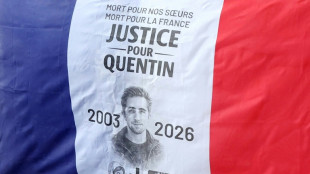
-
 Record Jacks fifty carries England to 202-7 in must-win Italy match
Record Jacks fifty carries England to 202-7 in must-win Italy match
-
European stocks, dollar up in subdued start to week

-
 African players in Europe: Salah hailed after Liverpool FA Cup win
African players in Europe: Salah hailed after Liverpool FA Cup win
-
Taiwan's cycling 'missionary', Giant founder King Liu, dies at 91
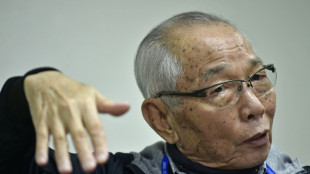
-
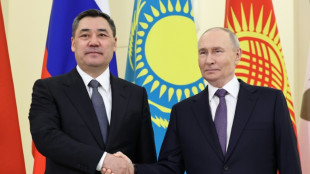 Kyrgyzstan president fires ministers, consolidates power ahead of election
Kyrgyzstan president fires ministers, consolidates power ahead of election
-
McGrath tops Olympic slalom times but Braathen out

-
 Greenland's west coast posts warmest January on record
Greenland's west coast posts warmest January on record
-
South Africa into Super Eights without playing as Afghanistan beat UAE


'Our mission': Auschwitz museum staff recount their everyday jobs
Barbed wire lines the road to work for Pawel Sawicki, deputy spokesman of the Auschwitz museum at the site of the former Nazi death camp that was liberated 80 years ago this month.
More than one million people died at the Auschwitz-Birkenau camp built by Nazi Germany when it occupied Poland in World War II -- most of them Jews, but also non-Jewish Poles, Roma and Soviet soldiers.
Around 850 people work at the museum to preserve their memory, a job with more emotional baggage than your usual nine-to-five.
"They say that when you start working here, either you leave very quickly because the history is too much or you stay for a long time," said Sawicki, who is in charge of social media at the museum and has worked there for 17 years.
"It helps if you find some meaning to the mission," the 44-year-old told AFP.
Sawicki's office is located inside a former hospital for the Nazis' notorious SS.
Behind the building there is an old gas chamber and farther on stands the camp's "Arbeit Macht Frei" (Work Will Set You Free) gate.
To cope with the heavy emotional toll of working at Auschwitz, Sawicki said he has put up "a sort of professional barrier" that keeps him sane, even if it cracks from time to time.
- Not a word -
Jacek Paluch, a longtime Auschwitz tour guide, said he makes sure to leave his "work at work" to avoid going crazy.
"But it's a special job, and a special place. It's impossible to leave all the history behind and not take it home with you," he told AFP.
The 60-year-old said he leads up to 400 groups of visitors each year around the former death factory.
More than 1.8 million people from across the world visited Auschwitz last year.
The museum offers tours of the site in more than 20 languages, led by around 350 guides.
The hardest, most emotional moments for Paluch are his encounters with former prisoners.
Once, Paluch came across a man sitting silently -- and unresponsive to questions -- on a bench, his arm tattooed with his former inmate number.
"His whole life, he never spoke a word to his family about what had happened here. Then, suddenly, at one Sunday breakfast, he began to talk," Paluch said.
"They stopped him and took him here so that he could tell his story where it happened," he continued.
"But when he walked through the 'Arbeit Macht Frei' gate, the memories came back. He went quiet again and no longer wanted to talk about any of it."
- 'Importance as evidence' -
Paluch said he knows when the job has taken its toll.
"A sign of fatigue, not necessarily physical but more mental, is when I have dreams at night that I'm leading groups," he said.
"That's when I realise I need to take some time off."
Wanda Witek-Malicka, a historian at the museum's research centre, had for years focused on child inmates of Auschwitz. But she had to abandon the difficult subject when she became a mother.
"At that moment, this particular aspect of Auschwitz history -- children, pregnant women, newborns -- I was in no state to handle it," she told AFP.
"The emotional weight of the site and the history was too much for me," the 38-year-old added.
Were the museum staff to reflect on the site's history round the clock "we'd probably be unable to get any work done".
Elsewhere at the site, conservator Andrzej Jastrzebiowski examined some metal containers once filled with Zyklon B, the poison gas used to kill inmates at Auschwitz.
He recalled his anger early on -- he has worked at the museum for 17 years -- when he had to conserve objects that had belonged to the Nazis.
"Later, I realised these objects had importance as evidence of the crimes committed here, and maintaining them is also part of our mission here," the 47-year-old told AFP.
- 'Give them a voice' -
Jastrzebiowski and his colleagues at the high-tech conservation department are responsible for preserving hundreds of thousands of items, including shoes, suitcases, metal pots, toothbrushes, letters and documents.
Most of the items had belonged to inmates before being confiscated upon arrival.
The conservators are also responsible for preserving the camp barracks, the barbed wire, and the remnants of the blown up crematoriums and gas chambers and other ruins at the site.
It is work of utmost importance, especially at a time when the number of living former inmates is dwindling fast.
"Soon there will be no more direct witnesses to testify and all that will remain are these items, and they will have to tell the history," said Jastrzebiowski.
"Our job is to give them a voice."
When he works on an item, he tries to discover the object's peculiarities to keep the job from becoming a mindless routine.
"It helps me to think of the items' owners, their stories," he told AFP.
"Most of all, it's the opposite of what the Nazis had wanted -- that their memory vanish, that they disappear forever."
S.Gregor--AMWN
